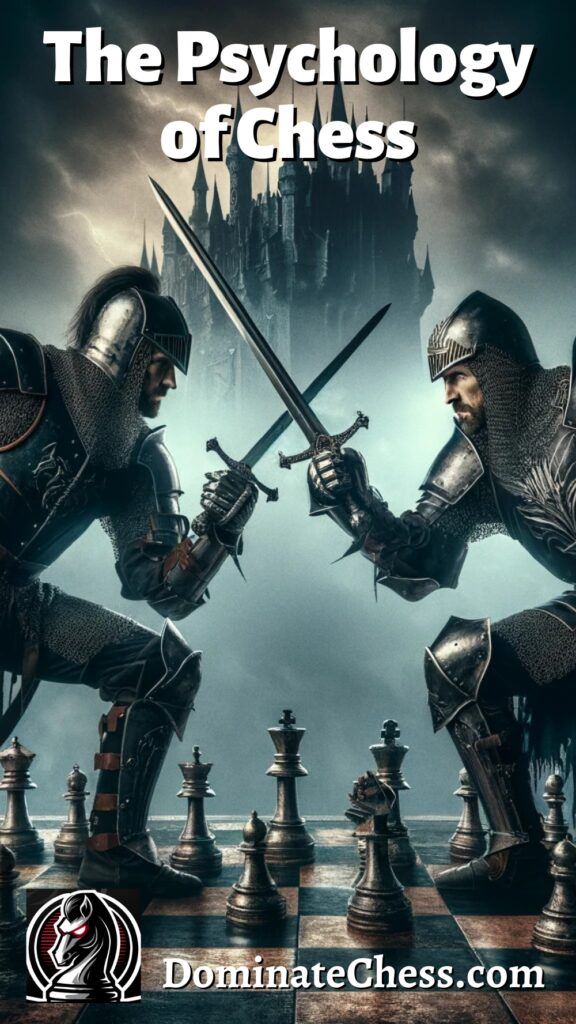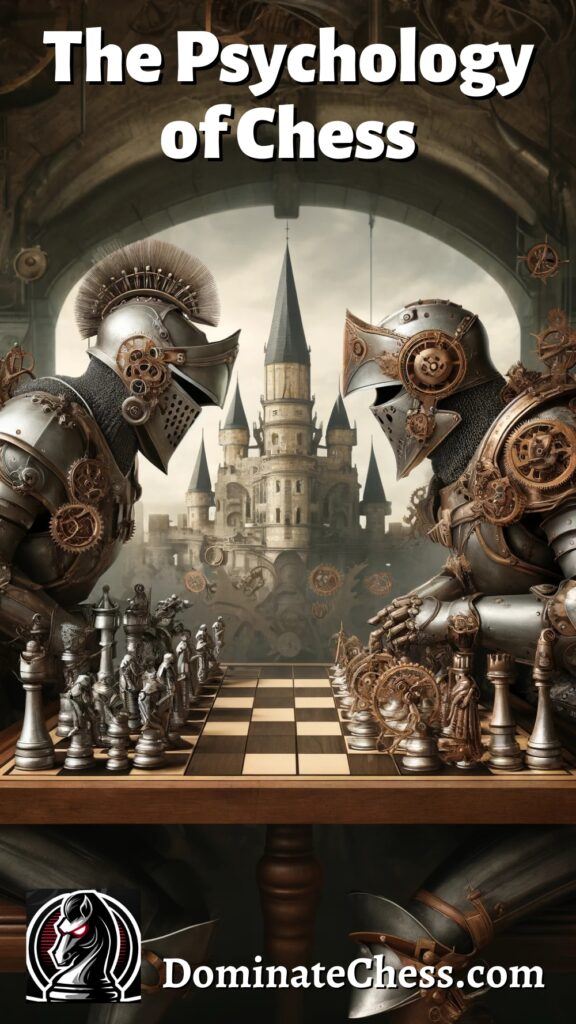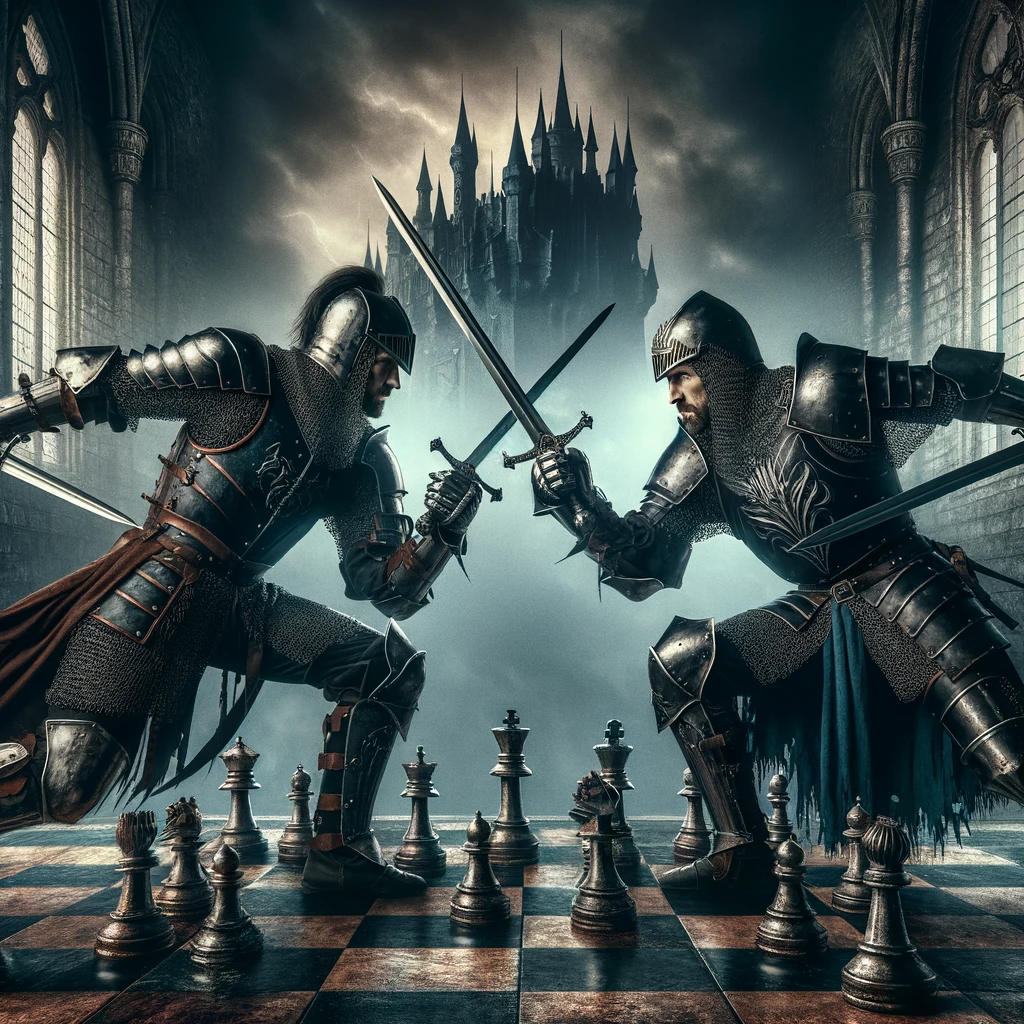Any fan of chess knows the intensity of a great chess match. You can feel it just watching. Chess isn’t just about moving pieces on a board, it’s also a deep dive into the players’ minds. Let’s dive into understanding the psychology of chess!
How Much of Chess is Psychology?
A huge part of chess is psychology. It’s about reading your opponent, anticipating their moves, and maintaining mental toughness. Understanding their mindset can often be the key to victory.
Here’s a cool video talking about several different aspects of psychology in chess that’s worth a watch.
Chess requires a strong strategic frame of mind. Both your patience and your problem-solving skills will play huge roles in your chess journey.
As players, we use cognitive abilities to outmaneuver our opponents, creativity and a strong memory to keep track of complex sequences of moves, and let’s not forget the heightened concentration necessary for keeping our focus during a long up and down game.
But chess isn’t all intellectual either, emotion can play a role in chess psychology as well.
Risk-takers might play bold gambits while methodical thinkers tend to prefer a more defensive approach. This relationship between personality and gameplay is a huge part of the game.
Let’s unpack these psychological layers. starting with strategic thinking.
Strategic Thinking In Chess Translating to Everyday Life
Just like every chess move requires forethought, an evaluation of your options, and a final assessment of potential consequences, the same principles apply when we make decisions, big or small, in our daily life.
Chess teaches us to stay a few steps ahead: Grandmasters always play with a plan, anticipating their opponent’s moves several moves ahead. This teaches the importance of foresight and contingency planning.
Do you know how many people nowadays don’t think ahead? It’s all about being prepared for what’s to come, whether planning a project at work or even planning your future goals.
Chess strategies have influenced businesses and educational systems: Did you know that corporate strategists will use chess principles to make more informed decisions that affect the future of their companies? Even educators implement chess in curriculums to instill strategic thinking in students from a young age, preparing them for complex problem-solving and logical reasoning later in life.
This article talks about just how deep chess influence reaches.
If you’re a regular chess player like I am, put these skills you’re practicing every day to good use. Whether it’s weighing the pros and cons before a decision, thinking long-term, or handling unexpected challenges, chess strategies offer valuable lessons you can apply every single day of your life.
Emotional Intelligence on the 64 Squares
We’ve covered how chess can act as a great metaphor for life’s strategic decisions, but beyond the logical, calculated moves, there’s a deep layer of emotion to explore too.
When you’re playing chess, have you ever felt like it’s this delicate dance you’re in the middle of? Both players have to manage feelings just as skillfully as they maneuver their pieces. Just like you play off each other’s moves, the same is true as you play off each other’s emotions.
The role of emotional intelligence in chess is huge. As players, we have to navigate through the stress of a ticking clock, the intensity of a bullet chess game, the sense of anticipation as a well-planned move is about to happen, and sometimes that harsh sting of an unforeseen defeat.
Learning to maintain composure is pivotal. If you lose it emotionally in the middle of a chess game, you’re done. You have to master the art of sitting with your emotions, analyzing them, and not allowing them to cloud your judgment or make you question your decision-making.
Chess is definitely an emotional battle pitting intuition against logic, and it happens every single game. A gut feeling might suggest one move, while logical analysis points to another.
What about the social aspect of the game when you’re playing over the board? Let’s dive into the psychological interplay between players.
The Social Aspect: Psychological Interplay Between Opponents
Chess is a silent conversation between players, and a dance of minds. This social aspect is extremely tangible in OTB (over the board) games as opposed to online play.
Understanding your opponent is a crucial, often overlooked aspect of a successful chess strategy. Each player brings a unique mix of aggression, caution, and even deception to the table.
Have you taken the time to read your opponent’s body language before and during a game? Their cues can give you a major advantage. Just like in poker, subtle physical tells can help you anticipate their next move or trap them into making errors.
In online games where so many of us like to play, this social dynamic is lost. It leaves us to focusing only on the moves on the board, and is one of the reasons online gameplay is sometimes seen as more difficult.
Add me on Chess.com! @DominateChessX
The Therapeutic Value of Chess
In the end, chess is a great exercise for the brain. Its intricacies challenge your mind, but there are also significant therapeutic benefits.
Imagine a form of meditation that sharpens your brain while simultaneously calming your nerves. That’s what chess can be. The concentration needed to anticipate moves and strategize can be deeply meditative.
And this is one of the reasons chess is so addictive. This state of deep focus is much like mindfulness practices that help clear the mind, combat stress, and elevate your overall mood.
But the mental health benefits of chess go beyond meditation. For individuals struggling with anxiety or depression, engaging in a structured yet creative activity like chess can provide a solid distraction and sense of accomplishment.
As players dive into the game, they momentarily step away from their worries and experience what’s called a flow state, leading to a more positive outlook on life. By facing challenging situations on the board, we learn to deal with setbacks, think critically under stress, and grow from our experiences.
Final Thoughts
Chess isn’t just a game; it’s a great way to boost strategic thinking, emotional control, and mental strength. The lessons learned on the board can help you succeed and stay positive in everyday life.
What do you think? How often do you find yourself engaged in a psychological battle during a game of chess just as much as the battle happening on the board? Let me know in the comments section below! I’d love to hear your perspective and I always reply!
Like This Article? Pin It!




Hello. Great read! This article goes deep into how chess is more than just a game of strategy, highlighting the psychological aspects that play a crucial role. It’s fascinating to see how chess can enhance emotional intelligence and strategic thinking, both on and off the board. Looking forward to more insights like this!
Thank you and thanks for the comment!
Really cool article thanks for sharing, as someone who loves games that revolve around strategic thinking I’m not as good at chess as I’d like to be. Can I ask how one would go about differentiating between losing because of a bad strategy or because of something that might be psychological or emotional (such as making bad moves in high pressure situations)?
Thanks again.
It’s all in the analysis of the game. If you’re playing online you can take a look and see how you were playing and where you made any blunders. If you were doing well and then suddenly collapsed, that would have something to do with your focus and keeping your mind right as you play. Thanks for the comment!